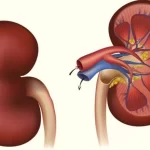Urethral infection
The kidney, ureter, bladder, and, ureter, form the urethra, during which bacterial infection is named urethral infection (Urinary Tract Infection or UTI).
What are the symptoms of urethral infection?
Symptoms of the effect of infection in several parts of the urethra also vary.
These symptoms may appear in lesser or greater amounts counting on the quantity of infection.
- Burning or pain while urinating.
- Frequent urination and urine drops.
- Fever
- Pain within the lower part of the abdomen.
- Red-colored urine.
Symptoms of kidney infection:
- Fever with cold.
- Back pain and feeling of weakness.
- Vomiting, nausea, weakness, fatigue, and general malaise. Mental changes and confusion may occur in elderly people.
- If not treated properly, this infection is often fatal.
- Frequent urination with a burning sensation may be a symptom of urethral infection.
What causes recurrent urethral infections:
- In women, a bladder infection can occur quickly thanks to the tiny ureter.
- Due to high levels of blood and urine sugar (glucose) in diabetes.
- Sexual intercourse – Sexually active Women are more likely to urge urethral infections than women who aren’t sexually active.
- Many men of adulthood suffer from increased urination thanks to enlarged prostate and in many ladies of adulthood, tract shrinkage and bladder aren’t empty.
- Urine catheterization: people that have urine inside the catheter are more susceptible to tract infection.
- Low immune system: Diabetes, HIV, and cancer patients are more susceptible to tract infections.
- Urinary stone disease.
- Blockage within the urethra: Stricture Urethra or the part between the kidney and therefore the ureter (Pelvic Ureteric Junction Obstruction).
Other reason:
Neurogenic Bladder within the normal functioning of the bladder, loss of urethra from birth so that urine is reversed from bladder to ureter (Vesico Ureteric Reflux), the effect of urethral decay (TB), etc.
Can repeated infections within the urethra cause any harm to the kidney?
In general, kidney infection doesn’t occur even after repeated infections within the urethra after childhood. But if there’s the presence of stones, obstruction, or tuberculosis within the urethra, then there’s a risk of kidney damage thanks to urethral infection.
If the infection of the urethra in children isn’t treated at an acceptable time, the kidneys might not be ready to recover again, thus causing damage. Therefore, the matter of urethral infection is more serious in children than at other ages.
The blockage of the urethra is the main explanation for frequent urinary infections.
Diagnosis of urethral infection:
The urethra is tested for the diagnosis of infection and its severity. an individual is liable for the infection and there are different types of tests for its diagnosis.
The presence of white blood cells within the urine indicates inflammation of the urethra but doesn’t indicate a urethral infection in its absence.
Normal urine test:
Pus Cells are an indicator of infection of the urethra in urine examination.
Special urine dipstick (leukocyte esterase and nitrite) test ensures urethral infection and such patients got to be further tested. The change in urine color is proportional to the number of bacteria within the urine.
Examination of urine culture and sensitivity:
The best test for diagnosis of urethral infection is to possess a urine culture and it should be done before starting antibiotic therapy. In patients with uncomplicated urethral infection despite treatment, urinary culture is suggested to verify the clinical diagnosis of urethral infection.
To guard the urine sample from possible infection, the patient is first asked to wash the genital area then the midstream urine is collected in a clean container. There also are other methods of collecting specimens for urine culture like suprapubic aspiration, catheter specimen urine, bag specimen, etc.
Examination of urine culture and sensitivity gives complete information about the sort of bacteria liable for the infection and effective medication for its treatment.
Blood tests of a patient with a urethral infection often include complete blood count (CBC), blood urea, serum creatinine, blood glucose, and C. reactive protein.
Other investigations:
A biopsy indicates the severity of the infection present within the blood.
The following tests are done to seek out the rationale for frequent pus within the urine and therefore the infection isn’t under treatment.
- Abdominal x-ray and sonography
- Intravenous urography (IVU)
- Voiding cystourethrogram (VCUG)
- Tb in urine Urinary Test of Bacteria (Urinary AFB)
- Cystoscopy by a urologist with a special sort of binoculars.
- Diagnosis and diagnosis by a gynecologist
- Culture testing of urine is vital for the effective treatment of urethral infection.
Prevention of urethral infections:
- Drink 3 – 4 liters of fluids daily. The fluid dilutes urine and helps to excrete bacteria from the bladder and urethra.
Urinate every two to 3 hours, and don’t postpone getting to the toilet. By stopping urine within the bladder for extended or longer periods, the bacteria have a chance to grow. - Use food containing vitamin C . (ascorbic acid) or fruit juice. This makes the urine acidic, which reduces bacterial growth.
Avoid constipation or treat it immediately. - Women and girls should be washed with water from front to back (not back to front) after using the restroom. This habit prevents the infection from spreading from the kidney area to the vagina and urethra.
- Before and after sexual activity keeps the genital and kidney areas clean and clean. Discard urine before sexual activity and after sexual activity and drink a glass of water immediately after intercourse.
- Women should wear only cotton organ wear (underpants) which are helpful for air circulation. don’t use tight-fitting (tight) paint and nylon underwear.
- Repeated urethral infection after sexual intercourse in women is often effectively prevented by taking one dose of an antibiotic after sexual contact. In urethral infection, it’s vital to require more water.
Treatment of urethral infection:
Taking more water:
In patients with urinary infections, excessive amounts of water are recommended.
Some patients have very high vomiting thanks to a kidney infection. They also got to tend a bottle of glucose by hospitalization. Take appropriate medicine to scale back fever and pain. Use a hot pad to scale back pain. As far as possible, avoid alcohol, smoking, and oil-chili food, because they irritate the bladder. it’s important to follow all preventive measures for urethral infection.
Treatment by medicine:
Patients with bladder infection problems are usually treated with clotrimazole cephalosporine or quinolones. These medicines are usually given for seven days.
Patients who have a severe kidney infection (acute pyelonephritis) are initially given antibiotics by injection. Commonly injections of cephalosporin, quinolones, and aminoglycosides group are utilized in this treatment. With the assistance of urine culture reports, simpler medicines and injections are selected. Despite the development of health, this treatment is taken for 14 days.
Examination of urine after treatment provides information about what proportion of treatment has benefited. The absence of urine within the urine after the completion of medicines indicates control of infection.
For successful treatment of urethral infection, it’s important to understand the explanation for repeated infections.
Treatment of the causes of urethral infection:
With the assistance of the required tests, which problem is present within the urethra, think to which the infection is recurring or the treatment isn’t getting used, it’s diagnosed. Keeping this diagnosis in mind, necessary changes in medication and operation are performed in some patients.





